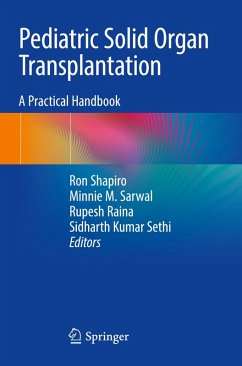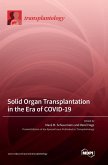Pediatric Solid Organ Transplantation
A Practical Handbook
Herausgegeben:Shapiro, Ron; Sarwal, Minnie M.; Raina, Rupesh; Sethi, Sidharth Kumar
Pediatric Solid Organ Transplantation
A Practical Handbook
Herausgegeben:Shapiro, Ron; Sarwal, Minnie M.; Raina, Rupesh; Sethi, Sidharth Kumar
- Broschiertes Buch
- Merkliste
- Auf die Merkliste
- Bewerten Bewerten
- Teilen
- Produkt teilen
- Produkterinnerung
- Produkterinnerung
This book covers all the protocols of pediatric solid organ transplantation in a practical format. It includes detailed protocols of managing a child during pre and post-transplant namely liver, kidney, heart, intestine and pancreas. Chapters include algorithms, figures and protocols in tabulated format. It also provides essential information on anatomy and physiology of relevant topics. The editors and authors are leading experts in the field from across the world.
This practical book serves as a useful and step-by-step guide for pediatricians, nephrologists, intensivists and transplant physicians and surgeons.…mehr
Andere Kunden interessierten sich auch für
![Pediatric Solid Organ Transplantation Pediatric Solid Organ Transplantation]() Pediatric Solid Organ Transplantation162,99 €
Pediatric Solid Organ Transplantation162,99 €![Solid Organ Transplantation in the Era of COVID-19 Solid Organ Transplantation in the Era of COVID-19]() Solid Organ Transplantation in the Era of COVID-1964,99 €
Solid Organ Transplantation in the Era of COVID-1964,99 €![Abdominal Solid Organ Transplantation Abdominal Solid Organ Transplantation]() Abdominal Solid Organ Transplantation81,99 €
Abdominal Solid Organ Transplantation81,99 €![Pathology of Solid Organ Transplantation Pathology of Solid Organ Transplantation]() Pathology of Solid Organ Transplantation161,99 €
Pathology of Solid Organ Transplantation161,99 €![Infectious Diseases in Solid-Organ Transplant Recipients Infectious Diseases in Solid-Organ Transplant Recipients]() Infectious Diseases in Solid-Organ Transplant Recipients97,99 €
Infectious Diseases in Solid-Organ Transplant Recipients97,99 €![Atlas of Dermatologic Diseases in Solid Organ Transplant Recipients Atlas of Dermatologic Diseases in Solid Organ Transplant Recipients]() Atlas of Dermatologic Diseases in Solid Organ Transplant Recipients130,99 €
Atlas of Dermatologic Diseases in Solid Organ Transplant Recipients130,99 €![Primary Care of the Solid Organ Transplant Recipient Primary Care of the Solid Organ Transplant Recipient]() Primary Care of the Solid Organ Transplant Recipient73,99 €
Primary Care of the Solid Organ Transplant Recipient73,99 €-
-
-
This book covers all the protocols of pediatric solid organ transplantation in a practical format. It includes detailed protocols of managing a child during pre and post-transplant namely liver, kidney, heart, intestine and pancreas. Chapters include algorithms, figures and protocols in tabulated format. It also provides essential information on anatomy and physiology of relevant topics. The editors and authors are leading experts in the field from across the world.
This practical book serves as a useful and step-by-step guide for pediatricians, nephrologists, intensivists and transplant physicians and surgeons.
This practical book serves as a useful and step-by-step guide for pediatricians, nephrologists, intensivists and transplant physicians and surgeons.
Produktdetails
- Produktdetails
- Verlag: Springer / Springer Nature Singapore / Springer, Berlin
- Artikelnr. des Verlages: 978-981-19-6911-9
- 2023
- Seitenzahl: 560
- Erscheinungstermin: 7. März 2024
- Englisch
- Abmessung: 235mm x 155mm x 29mm
- Gewicht: 940g
- ISBN-13: 9789811969119
- ISBN-10: 9811969116
- Artikelnr.: 69951911
- Herstellerkennzeichnung Die Herstellerinformationen sind derzeit nicht verfügbar.
- Verlag: Springer / Springer Nature Singapore / Springer, Berlin
- Artikelnr. des Verlages: 978-981-19-6911-9
- 2023
- Seitenzahl: 560
- Erscheinungstermin: 7. März 2024
- Englisch
- Abmessung: 235mm x 155mm x 29mm
- Gewicht: 940g
- ISBN-13: 9789811969119
- ISBN-10: 9811969116
- Artikelnr.: 69951911
- Herstellerkennzeichnung Die Herstellerinformationen sind derzeit nicht verfügbar.
Dr. Ron Shapiro is the Surgical Director of the kidney and pancreas transplant program at Mount Sinai's Recanati/Miller Transplantation Institute, New York, USA. Dr. Shapiro, a leading surgeon with more than 30 years of experience in the field of transplantation, trained at the University of Pittsburgh under Dr. Thomas E. Starzl, a transplant pioneer. Prior to returning to Mount Sinai, Dr. Shapiro was a professor of surgery at the University of Pittsburgh and the Robert J. Corry Chair in Transplantation Surgery at the Thomas E. Starzl Transplantation Institute, Pittsburgh, USA. After 26 years with the University of Pittsburgh, Dr. Shapiro left his endowed chair in Pittsburgh to return to The Icahn School of Medicine at Mount Sinai, where he had completed his internship and residency. Dr. Shapiro graduated with his medical degree from the Stanford School of Medicine. He is board certified in surgery with special expertise in renal transplant and pancreas transplantation.He is also Secretary of the Transplantation Society, and former president of the International Pediatric Transplantation Association (until March 2015). He is also on the editorial boards of Pediatric Transplantation, and is Editor in Chief of Clinical Transplantation. Dr. Shapiro has co-authored four books: Atlas of Organ Transplantation, Renal Transplantation, Pancreatic Transplantation and Living Donor Organ Transplantation. He has published more than 440 articles, and 75 book chapters, and has given more than 560 lectures. Dr. Shapiro has been repeatedly named by Castle Connolly, Ltd. as one of "America's Top Doctors." Dr. Minnie Sarwal is Medical Director of the Kidney Pancreas Transplant Program at the University of California, San Francisco (UCSF) and a Professor in Residence in Surgery, with courtesy appointments in Medicine and Pediatrics at UCSF. She is the Director of the Precision Transplant Lab, an NIH and Chan Zuckerbergfunded translational lab. She has an Adjunct appointment at the University of Berkeley as a Capstone mentor of the Masters in Translational Medicine Dr. Sarwal is a Consulting Professor at Stanford University where she was Medical Director of the Pediatric Kidney Transplant program, and Professor in Pediatrics, Immunology and Surgery. Dr. Sarwal's research interests include clinical trials, bioinformatics, translational immunogenetics, genomics, and proteomics. Dr Sarwal received her M.D. from India, completed her residency in the UK, and a fellowship in pediatric and adult nephrology at Guy's Hospital, London, UK. She holds a PhD in molecular genetics from Cambridge University (Christ's College), under the mentorship of Nobel Laureate Sydney Brenner; a diploma in child health from London, UK; membership of the Royal College of Physicians and elected fellow of the Royal College of Physicians, UK. Dr. Sarwal is an internationally recognized leader in the fields of renal and transplant translational medicine and immunology. She has founded multiple companies, spun out of academia and IP generated in her lab, with an emphasis of personalized diagnostics in transplant medicine. Dr Sarwal has been an Asian-American and Women's Mentor at Stanford University, is a Capstone mentor of the Masters in Translational Medicine program at Haas/Berkeley and UCSF, and currently the Senior Treasurer of The Transplantation Society. She is the Chief Editor of Frontiers in Nephrology and associate editor for Clinical Transplantation. Dr Sarwal has been the recipient of numerous awards and distinctions, inclusive of the NKF Cuneo Richardson Award for Scientific Excellence and the TTS-Roche Award for Outstanding Transplant Research. Dr. Sarwal serves on the FDA Science Board, NIH study sections and Chairs the Congressionally Directed Research Tissue/Transplant Program for the Department of Defense. Dr. Rupesh Raina is an Adult-Pediatric Kidney Disease/Hypertension Nephrologist at Akron Children's Hospital, and Akron General Medical Center at Cleveland Clinic Foundation. He is a Professor of Medicine and Professor Pediatrics at Neomed Medical University and Case Western Reserve University, Cleveland, Ohio. He is Council member for Facility of Internal Medicine Council at Neomed. Dr Raina is M-4 director for Neomed College of Medicine. Dr. Raina is the Pediatric Education committee member for the International Society of Nephrology, International, International Pediatric Transplant Association a. He is Fellow of National Kidney Foundation and American Society of Nephrology. Additionally, Dr. Raina serves the National Kidney Foundation Advisory Board NKF, Ohio.. Dr. Raina practice includes care of patients with disorders of the kidney including chronic kidney disease, nephrotic syndrome, glomerulonephritis, tubular disorders, cystic kidney disease, kidney malformations, neonatal AKI, kidney stones and hypertension.He also and provides medical supervision of dialysis treatments, plasma exchange and kidney transplantation in adults and children. Dr. Raina's clinical research interest includes transition of adolescent with chronic renal diseases to adulthood care, renal replacement therapies in acute renal failure, bone marrow transplant and inherited metabolic diseases. Basic science research includes but not limited to identify non-invasive biomarkers (urine endothelin (ET-1) and others) to predict ADPKD disease progression. Dr Sidharth Kumar Sethi is currently Senior Consultant, Pediatric Nephrology and Pediatric Renal Transplant Medicine, Kidney and Urology Institute, Medanta, The Medicity, India. He was trained as a fellow (International Pediatric Nephrology Association Fellowship) and senior resident in pediatric nephrology at All India Institute of Medical Sciences, India and Division of Pediatric Nephrology and Transplant Immunology, Cedars Sinai Medical Centre, Los Angeles, California. His main areas of interests are acute kidney injury, dialysis and pediatric renal transplantation. He has been actively involved in the care of children with all kinds of complex renal disorders, including acute kidney injury, dialysis, nephrotic syndrome, tubular disorders, urinary tract infections, hypertension, chronic kidney disease, and renal transplantation. He has been a part of 8-member writing committee for the Indian guidelines of Steroid Sensitive Nephrotic Syndrome and expert committee involved in the formulation of guidelines of pediatric renal disorders including Steroid Resistant Nephrotic Syndrome and urinary tract infections. He has more than 150 indexed publications in pediatric nephrology and chapters in reputed nephrology textbooks. He is a part of the Board of Directors, PCRRT-ICONIC Foundation, a foundation which aims to create awareness and spread education regarding critical care pediatric nephrology. He is Editor, Springer's Handbook of Critical Care Pediatric Nephrology & Pediatric Dialysis along with Dr Bunchman, Dr Raina and Dr McCulloch. He was awarded in 2014 by Case Western Reserve University, for his outstanding contributions to the field of Pediatric Nephrology.
Part I: Renal Transplant.- Pediatric Transplantation Historical View.- Transplant Immunobiology.- Deceased Donor Allocation Policy and Kidney Allocation System on Young Pediatric Recipients.- Donor-Recipient Size Mismatch in Pediatric Renal Transplantation .- Medical Evaluation of Living Kidney Donor in Childrens.- Surgical Management of Renal Transplant Patient.- Management of the Pediatric Renal Transplant with Posterior Urethral Valves for Successful Transplantation.- Induction Therapy in pediatric Transplantation Current Guideline.- Transition in Renal Trasnplant Patients.- Induction in Highly Sensitized Pediatric Renal Transplant Recipients.- Pediatric ABO-Incompatible Kidney Transplantation.- Immune Monitoring after Pediatric Renal Transplant and Approach to the Diagnosis and Management of Rejection.- Overview of Immunosuppressive Therapy in Pediatric Renal Transplantation.- Pediatric Immunosuppression Adherence.- Diagnosis and Treatment of Antibody MeditatedRejection.- Acute Vascular Rejection.- Infectious Complication in Pediatric Renal Transplant.- Hypertension post Renal Transplantation.- Recurrent Renal Disease after Transplant.- Post-Transplant Lymphoproliferative Disorders.- Management of Chronic Renal Allograft Dysfunction and when to Re-transplant.- Part II: Intestinal Transplant.- Indications and Management of Pediatric Intestinal Transplantation.- Intestinal and Multivesicular Transplantation in Children outcomes and Complications.- Long-term Management of Intestinal Transplant.- Part III: Pancreatic Transplant.- Pancreatic Transplant in Children.- Islet Auto Transplantation (TPIAT) and Management.- Pancreas: Autologous Islet Cell Transplantation in Children with Chronic Pancreatitis.- Part IV: Heart Transplant.- Pediatric Heart Transplantation-Indications and Outcomes.- Heart Transplantation Immunosuppression.- Heart: Combined Heart/Lung and Abdominal Transplantation.- Part V: Liver Transplant.- Perioperative management of Liver Transplantation.- Liver Transplantation in Children.- Combined Liver-Kidney Transplantation for Primary Hyperoxaluria Type 1.- Immune Monitoring after Pediatric Liver Transplantation.- Immunosuppression in Liver transplantation.- Hepatocyte Transplantation.- Liver: SPLIT Liver Transplantation: How to Make it Right!.- Part VI: Lung Transplant.-Pediatric Lung Transplantation: Indications and Outcomes.- Size-reduced Lung Transplantation in children.- Pediatric Lung and Heart-Lung Transplantation.- International Pediatric Lung and Heart-Lung Transplantation Experience.
Part I: Renal Transplant.- Pediatric Transplantation Historical View.- Transplant Immunobiology.- Deceased Donor Allocation Policy and Kidney Allocation System on Young Pediatric Recipients.- Donor-Recipient Size Mismatch in Pediatric Renal Transplantation .- Medical Evaluation of Living Kidney Donor in Childrens.- Surgical Management of Renal Transplant Patient.- Management of the Pediatric Renal Transplant with Posterior Urethral Valves for Successful Transplantation.- Induction Therapy in pediatric Transplantation Current Guideline.- Transition in Renal Trasnplant Patients.- Induction in Highly Sensitized Pediatric Renal Transplant Recipients.- Pediatric ABO-Incompatible Kidney Transplantation.- Immune Monitoring after Pediatric Renal Transplant and Approach to the Diagnosis and Management of Rejection.- Overview of Immunosuppressive Therapy in Pediatric Renal Transplantation.- Pediatric Immunosuppression Adherence.- Diagnosis and Treatment of Antibody MeditatedRejection.- Acute Vascular Rejection.- Infectious Complication in Pediatric Renal Transplant.- Hypertension post Renal Transplantation.- Recurrent Renal Disease after Transplant.- Post-Transplant Lymphoproliferative Disorders.- Management of Chronic Renal Allograft Dysfunction and when to Re-transplant.- Part II: Intestinal Transplant.- Indications and Management of Pediatric Intestinal Transplantation.- Intestinal and Multivesicular Transplantation in Children outcomes and Complications.- Long-term Management of Intestinal Transplant.- Part III: Pancreatic Transplant.- Pancreatic Transplant in Children.- Islet Auto Transplantation (TPIAT) and Management.- Pancreas: Autologous Islet Cell Transplantation in Children with Chronic Pancreatitis.- Part IV: Heart Transplant.- Pediatric Heart Transplantation-Indications and Outcomes.- Heart Transplantation Immunosuppression.- Heart: Combined Heart/Lung and Abdominal Transplantation.- Part V: Liver Transplant.- Perioperative management of Liver Transplantation.- Liver Transplantation in Children.- Combined Liver-Kidney Transplantation for Primary Hyperoxaluria Type 1.- Immune Monitoring after Pediatric Liver Transplantation.- Immunosuppression in Liver transplantation.- Hepatocyte Transplantation.- Liver: SPLIT Liver Transplantation: How to Make it Right!.- Part VI: Lung Transplant.-Pediatric Lung Transplantation: Indications and Outcomes.- Size-reduced Lung Transplantation in children.- Pediatric Lung and Heart-Lung Transplantation.- International Pediatric Lung and Heart-Lung Transplantation Experience.








